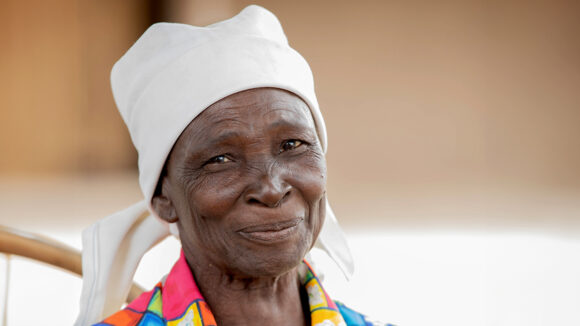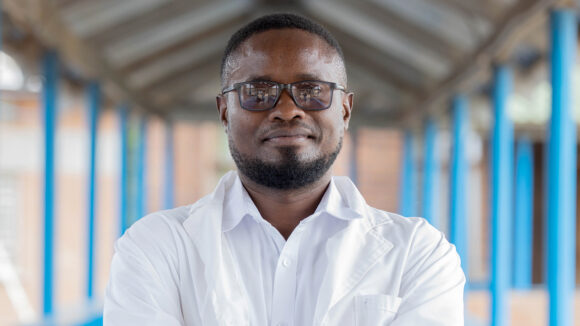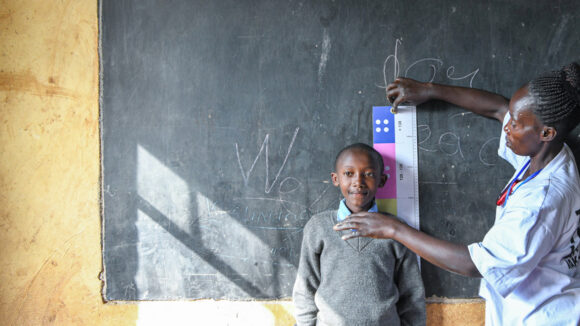
Nigeria
Community volunteer rewarded for his work to fight river blindness
An eye health volunteer from Ushongo who has distributed medication in his community for the past 20 years has been recognised by local leaders for his efforts to treat and prevent river blindness.
Emmanuel Nyamkeen, 54, was praised for helping to educate reluctant village chiefs about the benefits of providing medication, which led to the entire community accepting the treatment. His work has earned him a position as secretary for the council of chiefs in Mbakuwha ward, and he was presented with his own orange tree orchard by late Chief John Apir.
Emmanuel said: “The community leader came to plant the orange trees himself in my compound, telling me: ‘You are not a Ushongo man if you don’t have an orchard of oranges.’”
Emmanuel named the orchard ‘Mectizan’, after the medication used to protect people against river blindness. He now sells oranges to supplement his income, and gives them as gifts to visitors.
His work to distribute medication is supported by the UK’s Department for International Development. More from Nigeria


Ghana
Staff trained to help patients manage symptoms of lymphatic filariasis
A group of 215 health workers, community volunteers and teachers have taken part in a training course to help patients manage swelling in the arms and legs (known as lymphedema), one of the main symptoms of lymphatic filariasis (LF).
LF is transmitted by mosquito bite and affects the lymphatic system, and can cause painful swelling in the limbs, leading to disability and disfigurement.
After the training, participants were given washing basins, buckets, towels, antibiotic creams and other essentials, which they can use to help patients wash their affected limbs and alleviate their symptoms.
A register of lymphedema patients in the area has been set up, and 19 health centres in the Bono East region are now equipped to manage lymphedema cases.
The training aims to help patients like 50-year-old Amina, who has suffered years of stigma and discrimination because of the disease. She said: “If I’d learned about these management techniques earlier, I wouldn’t have suffered all the pains I have suffered. It has been a tremendous help to me.”
The work has been supported by Henry E Niles Foundation. More from Ghana

Mali
US ambassador to Mali visits Sightsavers project
Staff from Sightsavers’ inclusive education project in the Segou region met US Ambassador to Mali Dennis Hankins during his recent trip to the area.
Mr Hankins also met children with visual impairments who have benefited from the project, which aims to improve the education system in the region for children with disabilities.
The project, which is funded by USAID, was originally scheduled to end in June 2019, but has been extended until 2020. More from Mali

Zimbabwe
Trachoma trainers trained ahead of new drug distribution campaign
Six provinces in Kadoma have taken part in ‘training of trainers’ sessions, to ensure eye care staff and volunteers are ready for a new drug distribution campaign starting in 2020.
In total, 11 districts will take part in the campaign, which aims to distribute medication to local communities to protect and treat people for trachoma.
A group of surgeons have also been trained to carry out operations for advanced trachoma. Seven of the 11 surgeons are already working in the field, performing outreach surgery in five districts to ensure patients can be treated as close to home as possible.
The work is part of the Accelerate programme to eliminate trachoma in several countries by 2023. More from Zimbabwe
Read about our work around the world
Where we workMore stories from the field

“I’m a living testimony of cataract surgery”
When Angeshita regained her independence after her eye operation, so did her family. They are now able to return to school and work, giving them all hope for the future.

Alinafe cuts the queues
Learn about one man's mission to make a difference in Malawi by training as an eye health specialist.

“Our programme has transformed communities”
Now in its sixth year, the Accelerate programme has already delivered 53 million treatments to protect people from trachoma, and managed 91,000 advanced cases of the disease.